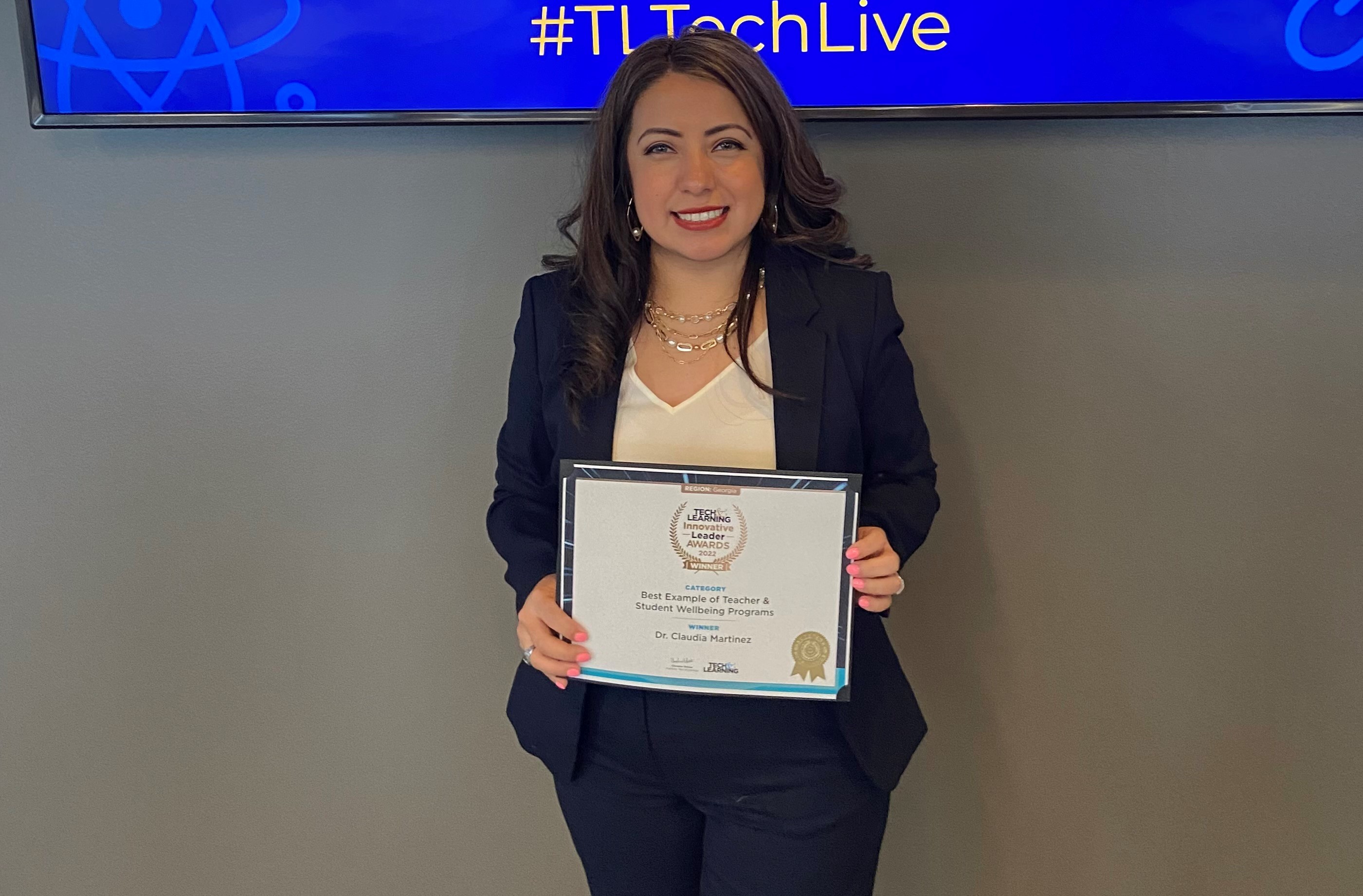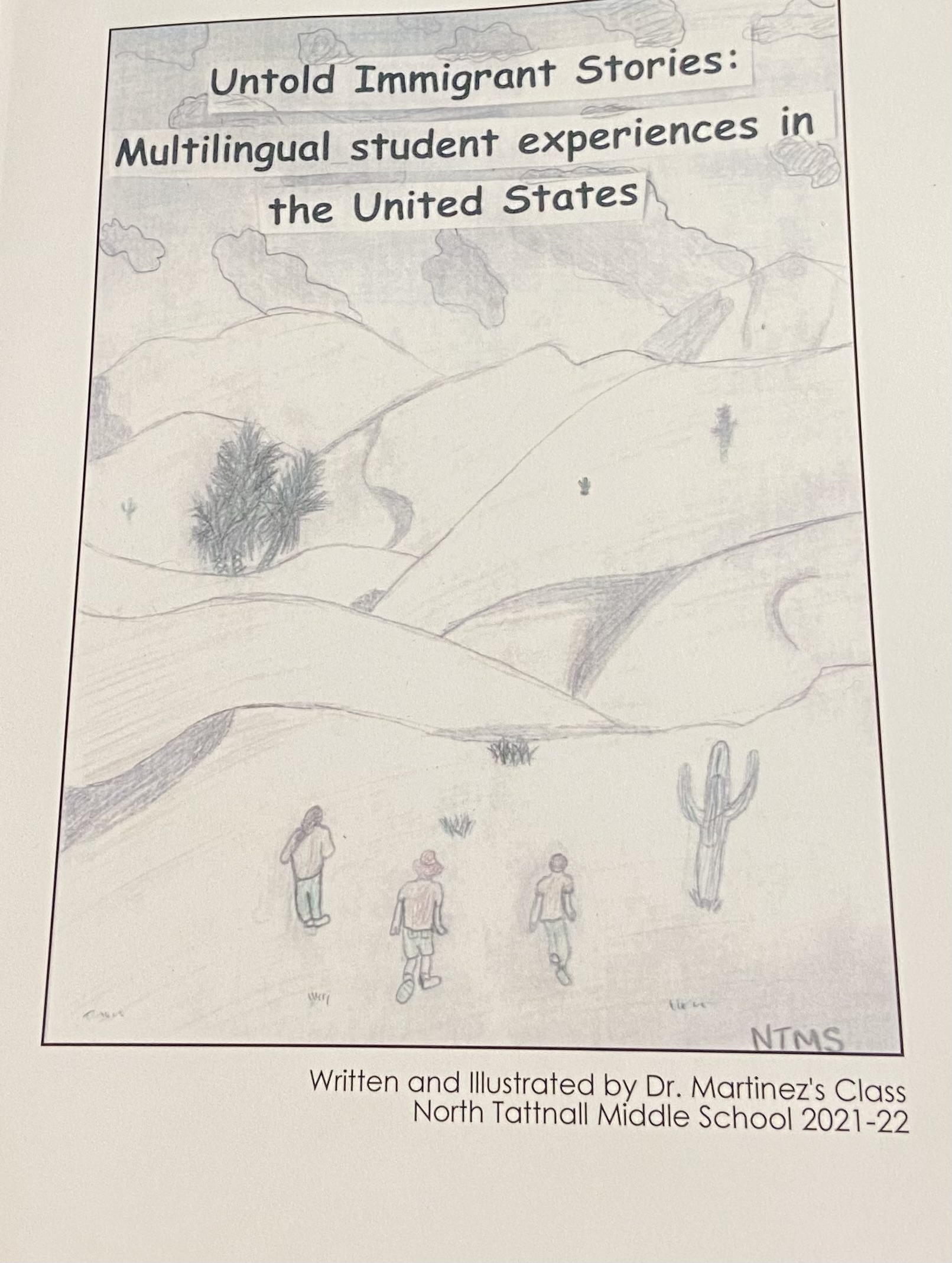This Award-Winning ESOL Teacher Wrote a Book With Her Students
Dr. Claudia Martinez, who wrote a book with her students at North Tattnall Middle School in Georgia, recently received the award for Best Example of Teacher & Student Well-Being at Tech & Learning’s Innovative Leader Awards in Atlanta.

A Mexican man hires a coyote border guide to get him into the U.S. He’s taken to a safe house in the desert and left with minimal food and water for two months. When the coyote returns and leads him across the desert, the man is chased by border patrol agents and their dogs, but escapes.
Ultimately, he travels to Alabama, where he works hard and makes enough money to support his elderly parents in Mexico.
This vivid story was captured during an interview conducted by one of Dr. Claudia Martinez’s students at North Tattnall Middle School in Georgia. It was included in Untold Immigrant Stories: Multilingual Student Experience in the United States, created by Martinez’s sixth-, seventh-, and eighth-grade ESOL students. The class book, which was provided to the students' parents by the district, includes interviews, essays, and poems, and tells the stories of the students, their families, and their communities.
For these and other efforts to support all students, Martinez was recognized as Best Example of Teacher & Student Well-Being during Tech & Learning’s Innovative Leader Awards in Atlanta.
Nominate someone for the Tech & Learning Innovative Leader Award here
The Power of Storytelling

Martinez immigrated to the U.S. from Mexico as a child. She struggled with learning English and adjusting to a new country at first. “I went through a silent stage,” she says. “Back then there wasn't a lot of help for English language learners.”
These hardships motivated her to become a teacher. “I wanted to make the lives of those students that were coming into a new school system easier,” she says. “I know that there's a lot of inequality still, and I want to create better opportunities for students in the United States.”
Tools and ideas to transform education. Sign up below.
Martinez became the first member of her family to complete college when she graduated from Georgia Southern University with a degree in early childhood education. She later obtained her masters and doctorate degrees from the same institution.
One of the findings of her dissertation was that storytelling could be a powerful tool for learning, which inspired the book project with her students.
“I want all of you to interview somebody in the community or family member that has a powerful story,” she told her students. “I feel that it's important for people to be educated on our struggle, and what we go through and the obstacles that we have to overcome.”
After the book was self-published, Martinez and her students were asked to share it with the local board of education. “When we presented it, some of the board members were crying because they were like, ‘We didn't know that you went through this,’” Martinez says. “My goal was for it to educate and to help build empathy. And I think it did that.”
Honoring Students and Their Stories
In addition to helping her students publish this book, Martinez has gone above and beyond to honor their diverse heritage. She helped to launch a Hispanic Heritage Month celebration that involved the community as well as the students, and has developed community support for student experiences such as STEM lab visits at Georgia Southern University.
Storytelling can lead students to become proud of their heritage, Martinez says. “It helps them to come to grips with their identity and who they are, and their limitations, and also what they can do in the future,” she says. “I'm always telling them my struggle, my story, what I went through and what I'm still going through, and they're able to relate.”
By sharing her own story, Martinez is able to build trust with students, which is key to the type of teaching she does. She advises other teachers trying to incorporate storytelling into their classes to focus on that trust, and to also make sure to protect those behind the stories. “We changed the names of the people that were interviewed to protect their identities,” Martinez says. “And we talked about the importance of that in the class.”
Discussing the project with students also helped them to take ownership of it and contribute in various other ways. “Our cover was designed by one of our students,” Martinez says. “It turned out amazing. He was really proud that he was the illustrator of the book.”
Erik Ofgang is a Tech & Learning contributor. A journalist, author and educator, his work has appeared in The New York Times, the Washington Post, the Smithsonian, The Atlantic, and Associated Press. He currently teaches at Western Connecticut State University’s MFA program. While a staff writer at Connecticut Magazine he won a Society of Professional Journalism Award for his education reporting. He is interested in how humans learn and how technology can make that more effective.

